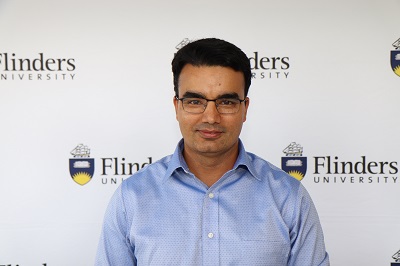
A new frailty index developed by a Caring Futures Institute researcher has the ability to measure frailty at population level, delivering broad benefits for the aged care sector.
The frailty index was developed and validated by SAHMRI-based Registry of Senior Australians (ROSA) Dr Jyoti Khadka who is a Flinders University Research Fellow from the Caring Futures Institute.
Dr Khadka says the frailty index project is set to improve aged care and health outcomes for vulnerable older people and can accurately predict an individual’s risk of death and likelihood of needing long-term residential aged care.
“This is extremely important information because frailty can be treated or prevented. Identifying risk enables timely treatment through relatively simple means such as diet and physical and mental exercises,” he says.
Frailty is often defined as a state of ageing-related physiological decline and vulnerability to adverse health outcomes such as increased dependency, falls and injuries, hospitalisation, institutionalisation and even death.
Dr Khadka says the frailty index is already considered a highly valuable tool in research across several ROSA projects.
“For instance, a study recently published in the journal Bone used the index to demonstrate how frailty changes the risk of death, functional limitation and higher level of aged care following a hip fracture,” he says.

Professor Renuka Visvanathan is a fellow research team member and an internationally recognised expert in geriatric medicine. She says the index can be used with the more than 186,000 aged care eligibility assessments currently performed each year by an aged care assessment team (ACAT).
“The assessment of a person’s frailty at this important time in their aged care journey can be used to flag those who might benefit from additional support to lower their risk of adverse events like hospitalisation,” she says.
“There is increasing interest for assessment programs which use electronic systems such as our Australian aged care eligibility assessments, which is supported by My Aged Care. This can produce a frailty risk score by the end of an assessment with the older person.”
Historial data involving more than 900,000 older Australians was used to develop the frailty index. The process behind the developed was published in the Medical Journal of Australia.
Development and validation of a frailty index based on Australian Aged Care Assessment Program data by Jyoti Khadka, Renuka Visvanathan, Olga Theou, Max Moldovan, Azmeraw T Amare, Catherine Lang, Julie Ratcliffe, Steven L Wesselingh and Maria C Inacio can be viewed online in the Medical Journal of Australia DOI: 10.5694/mja2.50720

